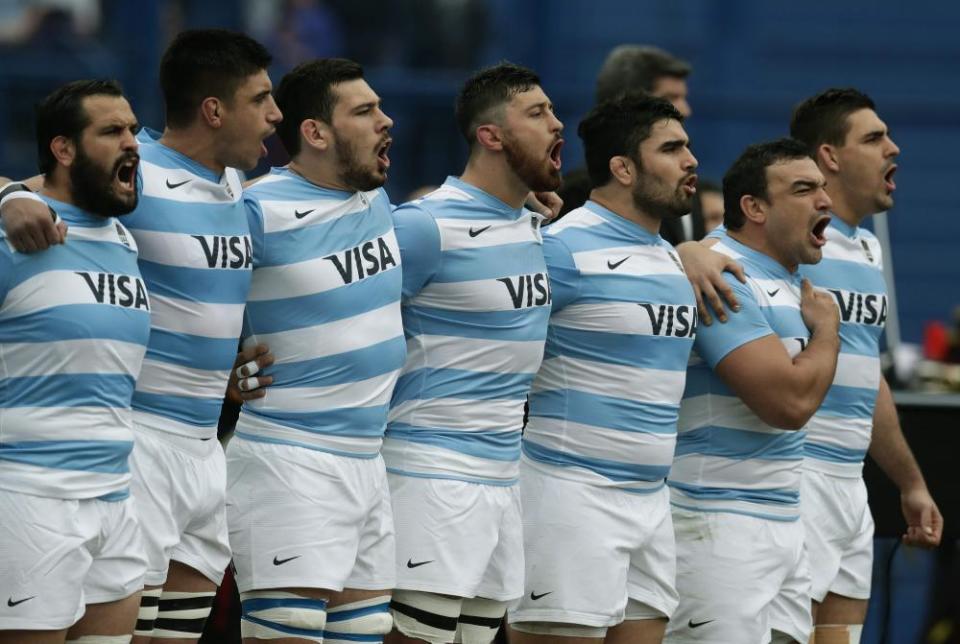Cross-border rugby hazards provoke questions over nations' futures

The format for next season’s European Champions Cup seems so complicated in its design that it could be an offshoot of cricket’s Duckworth-Lewis-Stern method. Two pools of 12 teams, who will each play four matches, will be layered by tiers with no two clubs from the same country facing each other.
An earlier plan divided the 24 teams into eight groups of three with the sides playing each other home and away. It was more straightforward than the one that has now been decided on, but with the coronavirus restrictions on travel, distancing and gathering looking as if they will remain in place well into next year, the organisers have given themselves some wriggle room.
Related: Exeter's Rob Baxter fears Champions Cup will be hurt by revised format
If Saracens were not allowed into Dublin this month for their quarter-final against Leinster at the Aviva Stadium because of quarantine rules and there was no exemption for elite athletes, or Ulster were unable to play Toulouse in France for the same reason, there would be no time for the matches to be rescheduled.
The choice would be between a coin toss or abandoning the tournament, although in Saracens’ case, could they circumvent the quarantine restrictions if they flew to Belfast and took a coach to Dublin?
Eight groups of three would give the organisers no wriggle room next season, which will be more condensed than usual because it is starting later, as the teams would all be from different countries. With two groups of 12, there is more chance of a hasty rearrangement of fixtures should local flare-ups of the virus occur.
Cross-border tournaments will remain hazardous for organisers for some time. This autumn’s eight nations tournament, which is replacing the customary autumn internationals because the Rugby Championship will be played at the same time, has yet to be finalised. Japan were invited, but have not accepted the invitation, because of their government’s rule on not allowing non-nationals into the country as part of its pandemic policy.
That meant their head coach, Jamie Joseph, among many others, was elsewhere and the team could not prepare for the tournament. The non-nationals rule was relaxed this week to allow back in ‘foreigners’ who had visas. It may be too late for Japan, whose players have not played since February, and Bernard Laporte, the French Rugby Federation president and World Rugby vice-chairman, recently hinted that South Africa would take their place.
The World Cup holders are due to be playing in the rescheduled Rugby Championship at that time. It is set to be held in New Zealand, but the other three countries would have to meet quarantine requirements before being allowed into the country. Many of the Springboks play abroad and would need to be released by their clubs by the middle of October at the latest to be available for the opening round of matches. The same applies for Argentina.

The wider question for South Africa and Argentina is where their future lies in the professional game. Super Rugby is set, for at least next year, to be restricted to New Zealand and Australia, for travel and financial reasons. It would jeopardise Argentina’s status as a tier-one nation and , for the Springboks, would leave a side who have won the World Cup three times in limbo.
South Africa has been edging closer to Europe in recent years. It has two teams in the Guinness Pro14 and the league may become a harbour for the country’s Super Rugby franchises. That has raised questions over the Springboks entering the Six Nations, either as a replacement for Italy, who have not won a game in the tournament since before the 2015 World Cup, or as a seventh member.
Related: England hope up to 22,000 fans will be at Twickenham for autumn games
Or would Georgia be invited to make it eight and the teams split into two conferences, with the top two in each going into a play-off along with the bottom two to determine final placings? That is unlikely because it would mean the interruption of traditional fixtures and in some years a team would only have one meaningful home match. And the venue for the final would need to decided in advance.
Any decision will be made primarily for commercial reasons and negotiations with the private equity firm CVC still have to be concluded. If an outsider investor becomes involved, there would be some respect for tradition, but no awe. At the start of the lockdown, the consensus was that everyone was in it together and that decisions on the structure of the game should be taken with mutuality in mind rather than personal interests.
That is proving challenging at a time when governments throughout the world pursue their own coronavirus policies rather than debate a common approach. Yet bringing South Africa into the European fold would have repercussions in the south, where New Zealand and Australia would be left with an Argentina side that may struggle to persuade some of its players who have moved to Europe to continue their international careers, and the option of Japan. But would it work commercially?
And would the Lions continue touring South Africa if the Springboks were part of the Six or Seven Nations? May as well go to France. South Africa and Europe are in the same time zone, but the move would only make sense if the others followed as part of a nations league in a global calendar.
This is an extract from our weekly rugby union email, the Breakdown. To subscribe, just visit this page and follow the instructions.

 Yahoo Sport
Yahoo Sport 





































